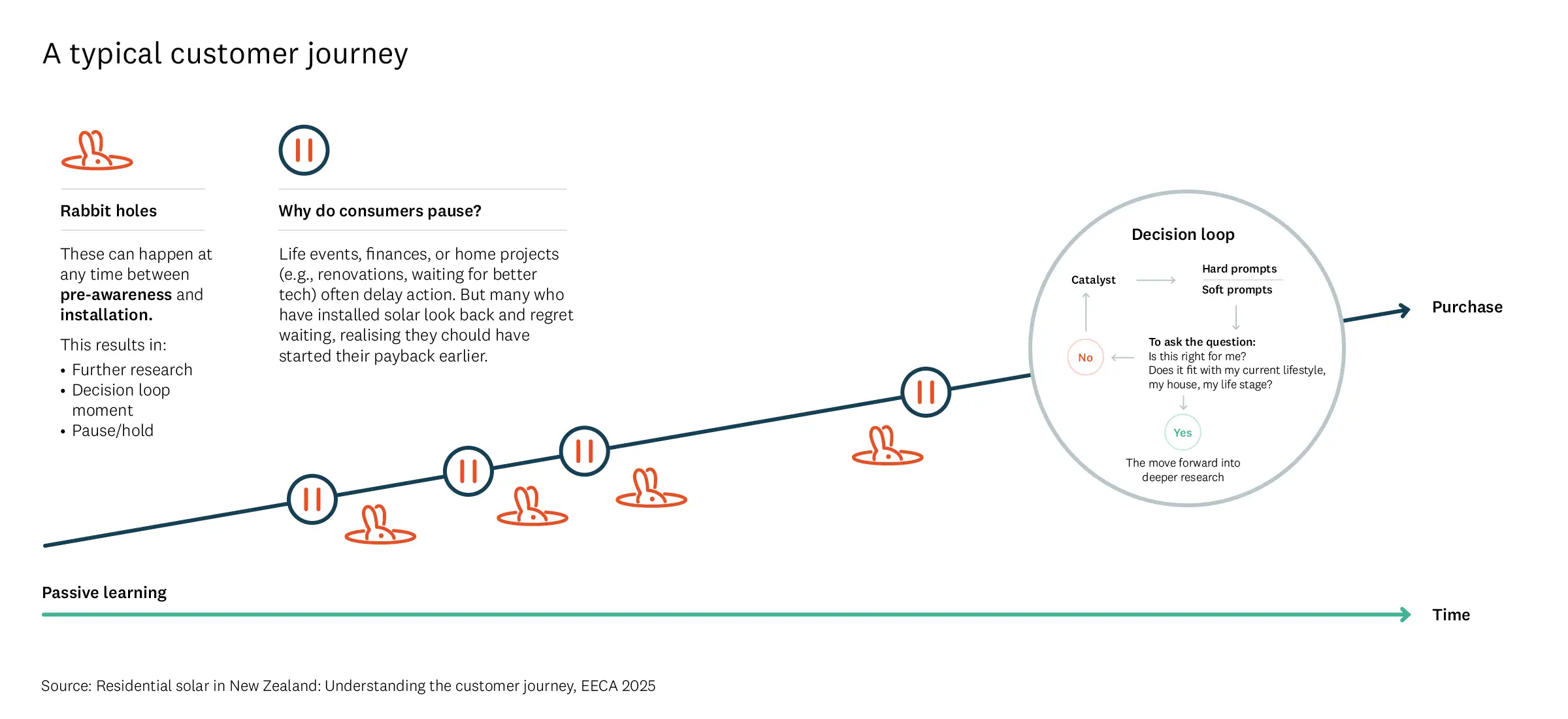Residential solar systems and battery storage are expected to play an increasingly important role in New Zealand’s energy future, as its uptake continues to accelerate. EECA has a strong role to play in supporting residential solar customers in their solar installation journey, through the provision of information and support to enable them to make informed decisions about their solar purchase.
This market research, conducted by TRA (The Research Agency), seeks to understand more about the consumer perspective and experiences related to residential solar.
About the research
This qualitative consumer research was conducted using both an online discussion board, and in-depth interviews. It engaged three key groups:
- Investigators — Investigated having solar installed in the past
12 months but decided not to proceed in the next 2 years. - Intenders — Are actively considering/planning on having solar installed in the next 12 months.
- Purchasers — Have had solar installed in the past 20 months.
Why we conducted this research
EECA wanted to better understand the current experience solar installation in New Zealand. Specifically, we explored:
- the experience of investigating, purchasing, and having residential solar installed
- awareness, perceptions, and understanding of solar products and their features
- the customer journey including motivators, barriers, needs, key milestones, key influences, sources of information, and opportunities to influence.
The purpose of this research was to identify opportunities to increase the uptake of residential solar and better understand the role EECA can play to support consumers on their journey — from initial interest through to purchase, installation and aftercare.
Key findings
The customer journey to solar purchase and installation is long but active.
While the journey is largely linear, it is punctuated by pauses due to life events, financial readiness, or uncertainty. Timeframes vary significantly — some move forward quickly, while others revisit the decision over many years. However, pauses and delays don’t necessarily mean lost customers — many are simply waiting for the right moment.

Research and learning are recurring across the entire journey - information gaps and overload are common.
Customers frequently report being overwhelmed by conflicting or overly technical information. Trust in sources is a major concern, not just in the messenger but whether information is current. Independent, neutral information is highly valued and can be difficult to find. There is a need for clearer, more accessible, and up-to-date content tailored to individual circumstances that supports customers at each stage of the journey.
Residential solar is aspirational but challenging to navigate.
Customers widely view solar as a desirable long-term investment offering energy independence, financial savings, and environmental benefits. However, they often struggle with understanding how to make it work in their specific context. The journey is information-intensive, often leading to decision fatigue or delayed action.
Post-install adjustments are complex.
The first 12 months of living with solar involves a steep learning curve. Almost all purchasers assume their system is “set and forget”, especially in the first few months of having solar installed and operational. Many experience lower-than-expected savings initially, confusion about system performance, and frustration over energy billing and export rates. Behavioural changes, such as shifting electricity use to daylight hours, are common as consumers adapt.
Customers become advocates.
Despite early challenges, the majority of purchasers reflect positively on their decision and become strong advocates. Many wish they had acted sooner and actively encourage others to adopt solar. Personal recommendations from solar adopters are often more influential than marketing or supplier outreach. Their real-world experiences provide social proof and reassurance.
Read the full report
Read next
-
Electrifying Aotearoa: The consumer perspective
New consumer research explores the status of household electrification among owner-occupiers in New Zealand.
- Electricity
- Products & appliances
- Market research
-
Commercial-scale solar in New Zealand
Information for businesses considering investing in solar energy.
- Renewable energy
- Solar energy
- Decarbonisation
-
How New Zealanders are using energy, December 2024
The Consumer Energy Monitor (Q2 FY25) captures data on how New Zealanders are interacting with energy in their homes.
- EECA Corporate
- Electricity
- Market research



